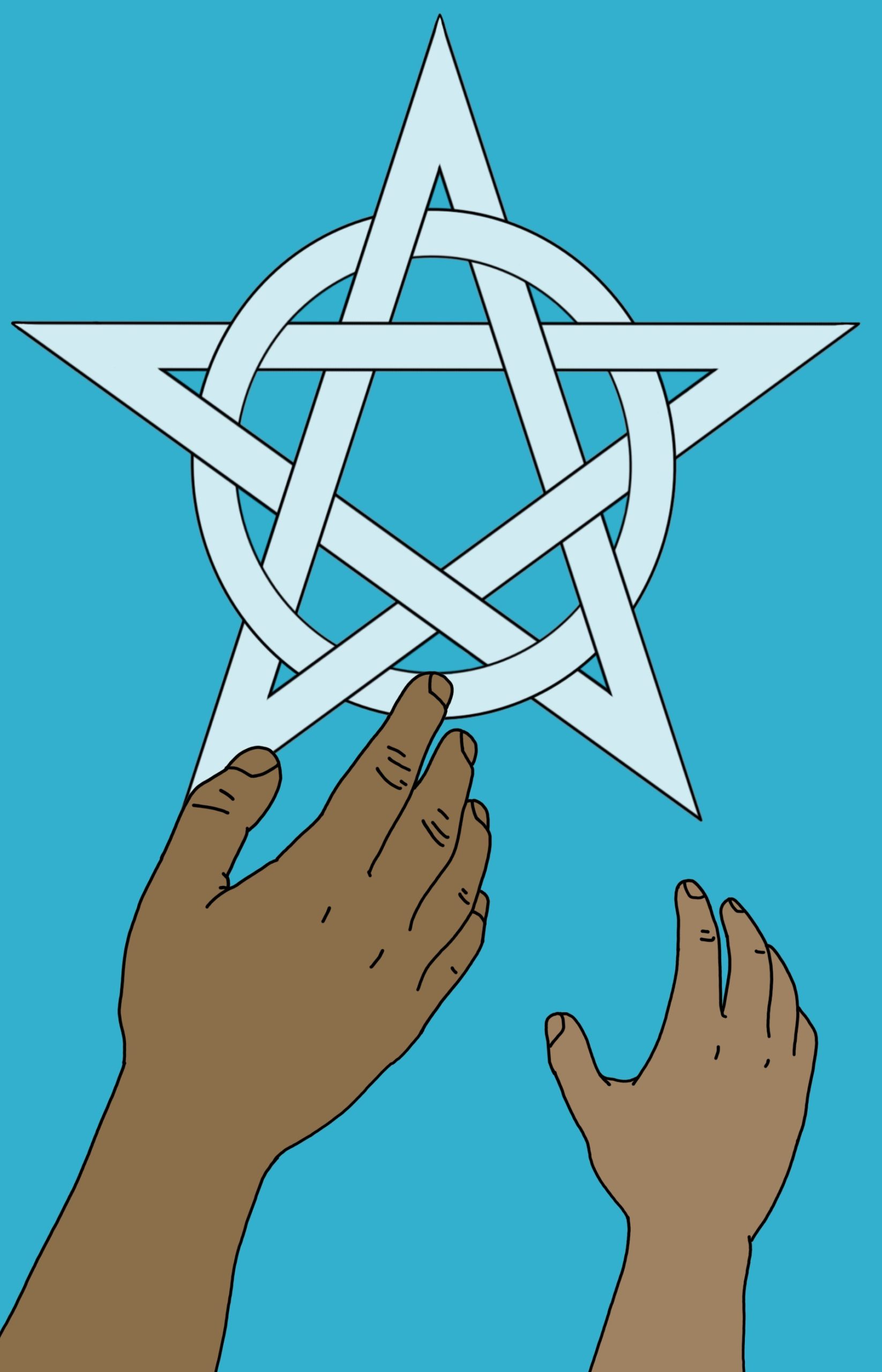Illustration by staff illustrator Sakura Siegel.
Paganism — it’s not what people today would call a main religion, but it most certainly exists all around us.
In fact, you might have even passed a Pagan on the street at one point or another, and you would never have known it. There are over 1.5 million Pagans in the U.S. alone.
So what is Paganism?
Some say it’s a satanic religion. Well, I did some research and spoke with a Pagan myself to get the facts.
While researching this religion I discovered that Paganism isn’t anything new, as some believe, in fact, it pre-dates Christianity.
Pagans believe that nature is sacred and that the natural cycles of birth, growth, and death observed in the world around us carry profoundly spiritual meanings, according to Weston Area Health. To them, humans, along with everything else on earth, are seen as part of nature.
But not all Pagans practice the same way. Some consider themselves witches, although not all witches are Pagans, nor are all Pagans witches.
Crystal R. Cigna, 33, is a Pagan. She is originally from New York and was more than happy to speak with me about Paganism.
What does paganism mean to you?
“Belief in the old gods and how they’re connected to us through nature.”
Pagans believe in many gods and goddesses, but not all Pagans worship the same gods and goddesses, or deities as they are referred to.
In Paganism, it’s up to each individual person to decide which deities they worship and work with — that makes it sound like a business partnership, doesn’t it?
Pagans ask their deities for assistance or guidance; some through prayer and meditation, others such as witches through spell work.
And in thanks, they give their deity offerings, though it’s not required. I questioned Cigna about this.
You said you give offerings of fruits and nuts, is that necessary? Or do you just do it as one way of thanking your gods?
“It is a way of thanking the gods, but it’s also a respect thing because they give you what you ask, they give you these things and you show your respect and your appreciation, now you could just say thank you to them, but you could also say thank you and give something in return. I like to research each god or goddess that I’m working with and offer them things that are associated with them, such as Aphrodite. I like to offer her strawberries and or apples.”
Now, this got me curious, I mean most religions have rules, guidelines you must follow to be a good practitioner of that specific religion, but the more I learned and heard about Paganism the more I realized that this religion didn’t seem to have any guidelines or rules to follow that is usually seen in main religions today.
And what I found fascinating was that, for those who feel drawn to Paganism, it works for them.
Each individual is left to create their own moral compass. It’s not about being the most moral person in the world; Pagans are flawed just like everybody else, and their religion seems to promote the idea of embracing their flaws and just being them.
I asked Cigna about this, hoping to confirm or deny the religion’s “no guideline” status.
As a Pagan, are there any rules or guidelines to follow? Such as how Christians are supposed to go to church and such?
“No, there are no set rules in Paganism, you’re not required to do anything really. The reason why we leave offerings and such is because we have a deep love for the gods and goddesses. But they do not require us to do specific things, though sometimes they give us messages in the form of spirit animals, or they’ll come to us in a dream, but no, nothing is required, we do it because we love and appreciate them.”
I couldn’t believe what I was hearing, and yet it’s all true.
While I was researching I came across something that I’ll admit, I did not believe at first.
I discovered that Pagans do not actively convert others to their faith. According to my research, they do not believe in attempting to sway others to their side, I wondered why that was, surely if they believed in what they do they would try to enlighten others?
That’s another aspect that makes it so vastly different.
I’m sure you can recall at least once in your life when you answered the bell for a door-to-door preacher who was trying to sway you to one faith or another? Or shamelessly hiding and pretending like nobody is home when they came back? Or was that just me?
Anyhow, I asked Cigna about this. I truly wanted to know.
Is it true that you don’t actively try to convert people to your religion? If so, why?
“No, we do not try to actively convert people to Paganism because it’s a choice, it’s a choice to love the gods, honor the gods, work with the gods. We don’t believe in forcing people to believe in stuff they don’t want to. We want people who actually love the gods to be part of this path, you know? Because if someone is just saying they love the gods then they’re not really Pagan. It’s just something they have to figure out for themselves.”
That wasn’t the answer I was expecting, and yet it made complete sense, I was beginning to realize that Paganism was truly a peaceful religion, nothing like the devil-worshipping cult that I had heard it was.
There was just so much to learn. I mean, according to what I had been told, a religion like this shouldn’t work as well as it did, with so many diverse paths and choices.
I was astounded that there really was no wrong way to practice Paganism, as long as you had an ardent love for the Gods and nature of course.
There was something that I came across while researching that I had been dying to ask.
Is it true that Pagans gather in covens and perform rituals in the woods?
“Yes some Pagans would do that, but what your saying sounds more like witches. Witches and Pagans are not always the same.”
While researching Paganism, I wondered about their holidays and such, Pagan holidays or Sabbats, as they’re called, are spread out across what they refer to as the wheel of the year, which consists of the year’s chief solar events and the midpoints between them.
At the top of the wheel, you have Yule, otherwise known as the Winter Solstice, which celebrates the rebirth of the sun.
Going clockwise you then have Imbolc, followed by Ostara, then Beltane, Litha (summer solstice), Lughnasadh (Lammas), Mabon, and Samhain. All of which date back to the beginning of Paganism.
In fact, holidays such as Yule underwent Christianised reformulation resulting in the term Christmastide. Many present-day Christmas customs and traditions such as presents and the Yule log, Yule goat, Yule boar, Yule singing and others stem from Pagan Yule traditions.
So, while Paganism might differ from main religions, it certainly isn’t a satanic cult as some believe.
This ancient religion is really quite fascinating, and with that, I only had one more question for Cigna.


